Menu


There is no denying it – reishi mushroom extracts are garnering huge interest among pet parents and veterinarians. They are multi-benefit additions to dog and cat diets and supplement protocols. But why are experienced veterinarians and pet carers turning to the reishi mushroom for dogs in particular?
When it comes to functional mushrooms for pets, the most popular one has been the turkey tail mushroom (Trametes versicolor). This interest has occurred in part because there are two compelling veterinary clinical studies that researched the impact of an extract from pure turkey tail mycelium on dog health.
There is another mushroom that rivals the turkey tail in the clinical study department, but it is on the “human” side. This highly-studied mushroom is Ganoderma lucidum, a.k.a. Reishi. Reishi (Lingzhi in Traditional Chinese Medicine) is a wonderful mushroom to consider for your dog, and possibly your cat. We will get to the “possibly your cat” explanation later on in this blog.
Reishi, often referred to as the “mushroom of immortality,” has been used in Traditional Chinese Medicine (TCM) to improve health and longevity for thousands of years. It is one of the most popular functional mushrooms in China, Japan, and Korea.
TCM practitioners have long prescribed reishi to influence the Heart, Lungs, Liver, and Kidney channels, balance Qi (the body’s life force), calm the mind, and relieve cough and asthma.
This reishi mushroom was and is revered in China, in particular, because of its multi-faceted and storied health-supporting properties, so much so that it is common to see reishi represented in ancient and modern art, literature, and architecture.
Reishi contains over 400 different beneficial compounds. These include triterpenoids, polysaccharides (including beta-glucans), nucleosides, sterols, steroids, fatty acids, proteins, peptides, and trace elements [1].
Many of these beneficial compounds are secondary metabolites. Secondary metabolites are natural products synthesized by bacteria, fungi, and plants. They are not essential for growth (in contrast to primary metabolites like chitin and beta-glucans), and many of these secondary metabolites have been used in the creation of drugs.
An example of this is Taxol, an antitumor agent derived from plant secondary metabolites [2, 3]. These secondary metabolites send complex messages to the cells that are primed to receive these signals. It is somewhat like the alphabet, where the more letters that are available, the more sentences can be written.
In Reishi's case, a triterpene called ganoderic acid is the secondary metabolite receiving the most attention and research. Some of the benefits of this reishi triterpene include antitumor, antimicrobial, anti-malaria, antihepatotoxic, and blood pressure reduction activity [4]. There are many more triterpenes in reishi in addition to ganoderic acid. These triterpenes work on their own to provide specific health benefits and act synergistically with the beta-glucans in the reishi mushroom.
These triterpenes are also what give Reishi its distinctive bitter taste. Reishi is definitely the most bitter of the popular functional reishi mushrooms. This bitterness is something to be aware of when considering using this reishi mushroom in our pet protocols. It is a rare dog or cat that doesn’t shy away from any taste. Bitter is often associated with something being poisonous, so animals instinctively shy away from bitter tastes [5]. Later in this blog, we will discuss some ways to “hide” the bitter taste so that reishi is more palatable for pets.
One of the more challenging aspects of working with reishi mushrooms is the lack of actual clinical data or studies related to veterinary medicine. There are very few studies focusing on dogs and, as far as I know, none on cats. It is for this reason that we have to turn to human clinical studies, to in vitro (test tube or petri dish) and in vivo (lab animal, usually rat or mouse) studies. We can also consider the evidence from the abundance of anecdotal feedback from pet parents touting the health benefits they are seeing when they add reishi mushrooms to their pets' lives.
Here are some of the health benefits that have compelled veterinarians and pet parents to begin using reishi mushrooms for dogs:
Let’s dive deeper into a few of these health benefits...
Reishi has a beneficial effect on the nervous system and may be helpful for anxious pets or during stressful situations like thunderstorms or fireworks.
TCM practitioners have long utilized reishi to help alleviate insomnia and anxiety and as a support for meditation. Mouse studies have shown reduced sleep latency and prolonged sleep duration with Reishi [6].
This is one reason Dr. Rob Silver added reishi to Real Mushrooms’ “Relax” pet chews: for its potential to be an excellent calming agent for dogs and cats. It is also a wonderful synergistic mushroom to lion’s mane, which is also in the “Relax” chews.
Overall, Reishi exhibits broad neuroprotective effects. Reishi should be considered in the case of animal neurodegenerative diseases and brain injury, Canine Cognitive Dysfunction, degenerative myelopathy, spinal cord injury, stroke, or epilepsy [7].
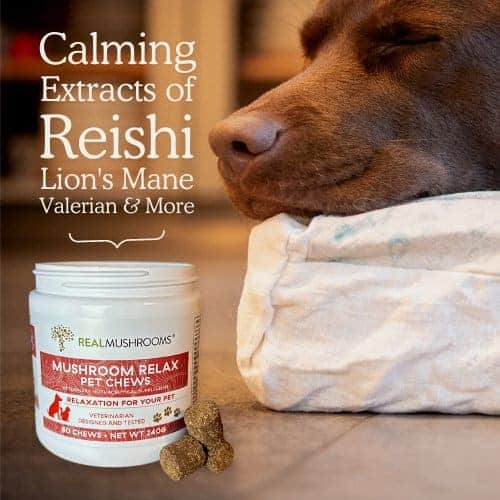
An exciting and promising use for reishi in veterinary medicine is in relation to allergies, asthma, and possibly mast cell cancer.
Dogs and cats with seasonal allergies may benefit from the immune-modulating and antihistamine activity of Reishi. Ganoderma (Reishi) helps to stabilize the mast cells to inhibit their release of histamine. Histamines are released by mast cells in reaction to allergens or pathogenic invaders. An overactive response—such as we find with allergies—can cause itching, runny nose, eye irritation, and redness of mucous membranes. In our pet population, this can look like excessive scratching/chewing, sneezing, wheezing, or runny discharge from the eyes or nose.
A 2010 study involving mice showed that the extract of G. lucidum can inhibit the release of histamine from mast cells in vitro, suggesting that G. lucidum extract has anti-allergic activity and could be effective against mast cell-mediated itch [8].
Martin Powell, a Traditional Chinese Medicine practitioner, biochemist, author, and mushroom expert, weighs in on administering reishi mushrooms for dogs with allergies:
“Ganoderma lucidum (reishi) as immunonutrition, with its unique array of compounds working in concert, could play a major role in current treatment practices for histamine-mediated allergic response. Ganoderma lucidum (reishi) is an effective agent to restore the normal balance between the TH1 and TH2 immune states in patients with histamine-mediated immune responses. Such an approach treats the underlying cause for the TH2 condition.” [9]
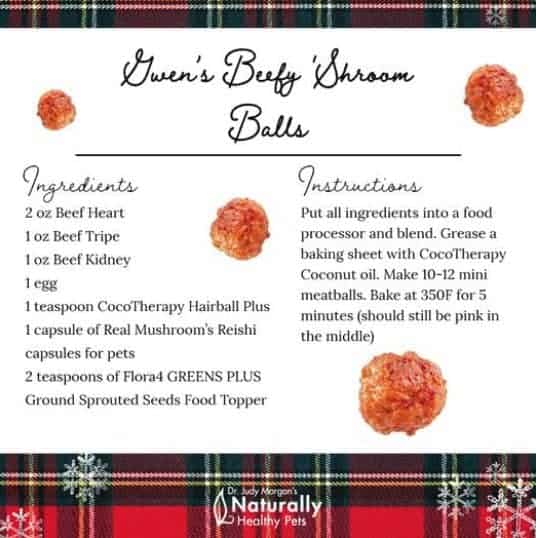
PubMed is an excellent free resource to explore clinical studies. When “Ganoderma and cancer” is entered into the PubMed search engine, 683 results are available. This is an indication of how much attention reishi is receiving when it comes to cancer research.
Reishi acts as a biological response modifier (BRM): it can modulate the immune response needed by the body. The reishi mushroom’s antioxidant properties and compounds can stimulate both the innate and adaptive immune systems. Reishi interacts in a positive way with natural killer (NK) cells, neutrophils, and macrophages, and stimulates cytokine expression and secretion.
A good example of this BRM activity is in relation to cancer. In general, Reishi triterpenes could directly suppress the growth and invasive behavior of cancer cells, whereas reishi polysaccharides, such as beta-glucans, could synergistically modulate immune anti-cancer activity. The result is the activation of Natural Killer T cells and the production of anti-neoplastic cytokines [6].
Reishi may be a good mushroom to consider if you have opted to have chemotherapy or radiation treatment for your pet. Radiation and chemotherapy can kill stem cells for red and white blood cells in the bone marrow. This results in anemia and a deficit of the important white cells needed to maintain health and freedom from infections.
Reishi can support animals undergoing cancer treatment by helping to protect their stem cells from the toxicity of chemotherapy or radiation therapy. An interesting study induced immunosuppression in mice and then treated them with a water-soluble extract from reishi. The researchers found the reishi-treated mice had increased red blood cells (RBCs), white blood cells (WBCs), NK T cells, splenic NK cells, and a number of bone marrow cells [10].
Additionally, reishi has the potential to enhance the effects of chemotherapy by increasing the dose of a chemotherapeutic agent that accumulates within a cell. A study using Ganoderic acid, the triterpene mentioned earlier, found it enhanced the accumulation of the chemotherapeutic agent cisplatin in tumor cells [10].
DO remember that not all mushrooms are the same. These are all either human, in vitro, or in vivo studies. There are currently no clinical studies of reishi in veterinary medicine. Regardless, if I had a dog or cat that was dealing with cancer, I would definitely consider adding reishi extract to the protocol along with turkey tail mushroom extract. This can be done by using these single mushrooms alone or by utilizing our 5 Defenders(™) mushroom extract complex for pets that contains reishi, turkey tail, shiitake, maitake, and chaga.
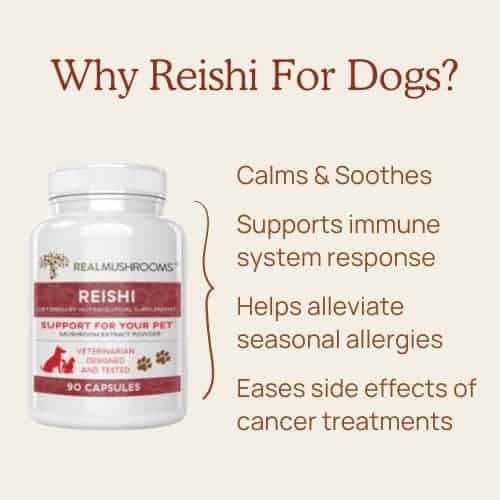
Unlike some of the other therapeutic mushrooms, reishi is not a culinary mushroom. It needs to be given as a natural supplement because it is too tough and leathery to be eaten as food.
It’s also important to remember that reishi is very bitter. The easiest way to administer the reishi is either in capsule form or as a pet chew. Dr. Rob Silver, Real Mushrooms Chief Veterinary Officer and product formulator, created 2 wonderful Real Mushrooms pet chews containing reishi! Our Relax chews for pets are calming and our Immune chews are for supporting the dog’s immune system.
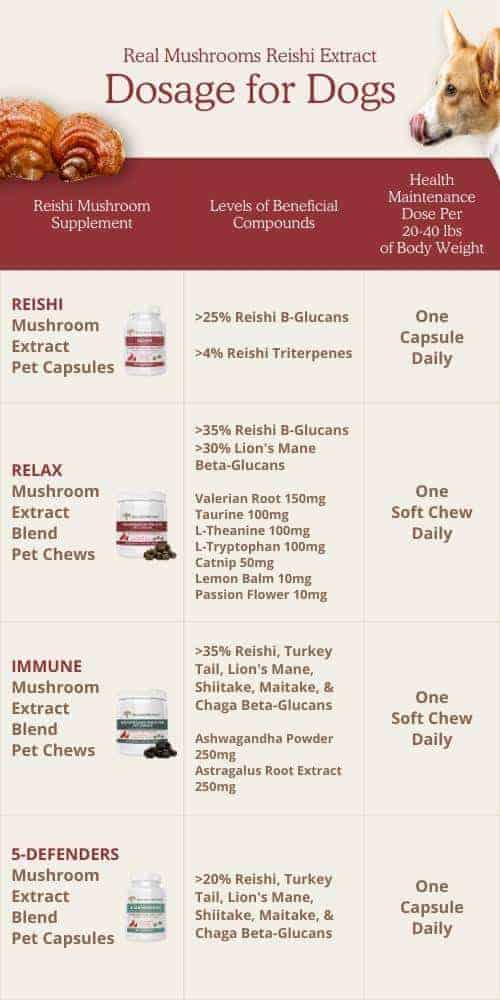
There are some cats that will accept being given the reishi capsules, and quite a few enjoy the pet chews. However, do be aware that it could be difficult to get Reishi into a very finicky cat, because of its bitterness. Milder-tasting mushrooms like lions mane or cordyceps might be the better choice for the picky kitty.
Finally, do your homework when purchasing reishi mushrooms in the supplement marketplace.
According to a 2017 study published in the journal Scientific Reports, 74% of Reishi products did not live up to the package claims.
Before purchasing reishi mushroom supplements, or any supplement for that matter, it is highly recommended that you do some research. Know what to look for in a good quality reishi mushroom supplement.
Here is some good information on what to look for in a reishi product: How to I.D. the Best Reishi Mushroom Supplement.
Do reach out to the Real Mushrooms Pet team if you have any questions about buying and using an extract of reishi mushroom for dogs:
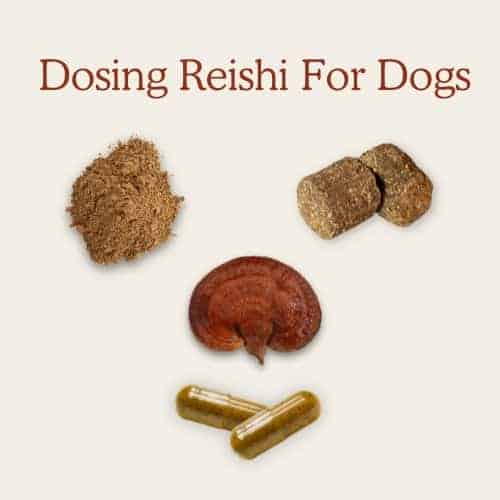

1) Zhou, L.-W. et al. 2015. ‘Global diversity of the Ganoderma lucidum complex (Ganodermataceae, polyporales) inferred from morphology and multilocus phylogeny’, Phytochemistry, 114, pp. 7–15. doi: 10.1016/j.phytochem.2014.09.023.
2) S. Sanchez, A.L. Demain. 2014. Secondary Metabolite - an overview.
3) https://www.sciencedirect.com/topics/agricultural-and-biological-sciences/secondary-metabolite
4) https://www.scirp.org/journal/paperinformation.aspx?paperid=99724
5) https://academic.oup.com/emph/article/9/1/431/6395358
6) Xia Feng, Yan Wang. April 30, 2019. Anti-inflammatory, anti-nociceptive and sedative-hypnotic activities of lucidone D extracted from Ganoderma lucidum. https://pubmed.ncbi.nlm.nih.gov/31078150/
7) Xiangyu Cui, Yonghe Zhang. 2019. Neuropharmacological Effect and Clinical Applications of Ganoderma (Lingzhi). https://pubmed.ncbi.nlm.nih.gov/31777017/
8) Inhibitory Effects of the Methanol Extract of Ganoderma lucidum on Mosquito Allergy–Induced Itch-Associated Responses in Mice111123 Tsugunobu Andoh , Qun Zhang , Takumi Yamamoto , Manabu Tayama , Masao Hattori , Ken Tanaka ,and Yasushi Kuraishi. DOI: 10.1254/jphs.10180fp
9) https://www.mycologyresearch.com/articles/view/28?utm_campaign=PNL%2020%20%28T8qGiB%29&utm_medium=email&utm_source=Practitioner%3A%20Newsletter%20Sequence&_kx=bL9S6QskVAqy0hm7niluqiuPq-JYxdvNxQCw9GnYr4k%3D.L3MBgQ
10) Sanem Bulam, N Şule Üstün, Aysun Peksen. April, 2019. Health Benefits of Ganoderma lucidum as a Medicinal Mushroom. https://www.researchgate.net/publication/335032099_Health_Benefits_of_Ganoderma_lucidum_as_a_Medicinal_Mushroom
11) Evaluation on quality consistency of Ganoderma lucidum dietary supplements collected in the United States https://www.nature.com/articles/s41598-017-06336-3 Ding-Tao Wu, Yong Deng, Ling-Xiao Chen, Jing Zhao, Anton Bzhelyansky & Shao-Ping
Disclaimer: The information or products mentioned in this article are provided as information resources only, and are not to be used or relied on to diagnose, treat, cure, or prevent any disease. This information does not create any patient-doctor relationship, and should not be used as a substitute for professional diagnosis and treatment. The information is intended for health care professionals only. The statements made in this article have not been evaluated by the Food and Drug Administration. Any products mentioned are not intended to diagnose, treat, cure, or prevent any disease. The information in this article is intended for educational purposes. The information is not intended to replace medical advice offered by licensed medical physicians. Please consult your doctor or health practitioner for any medical advice.
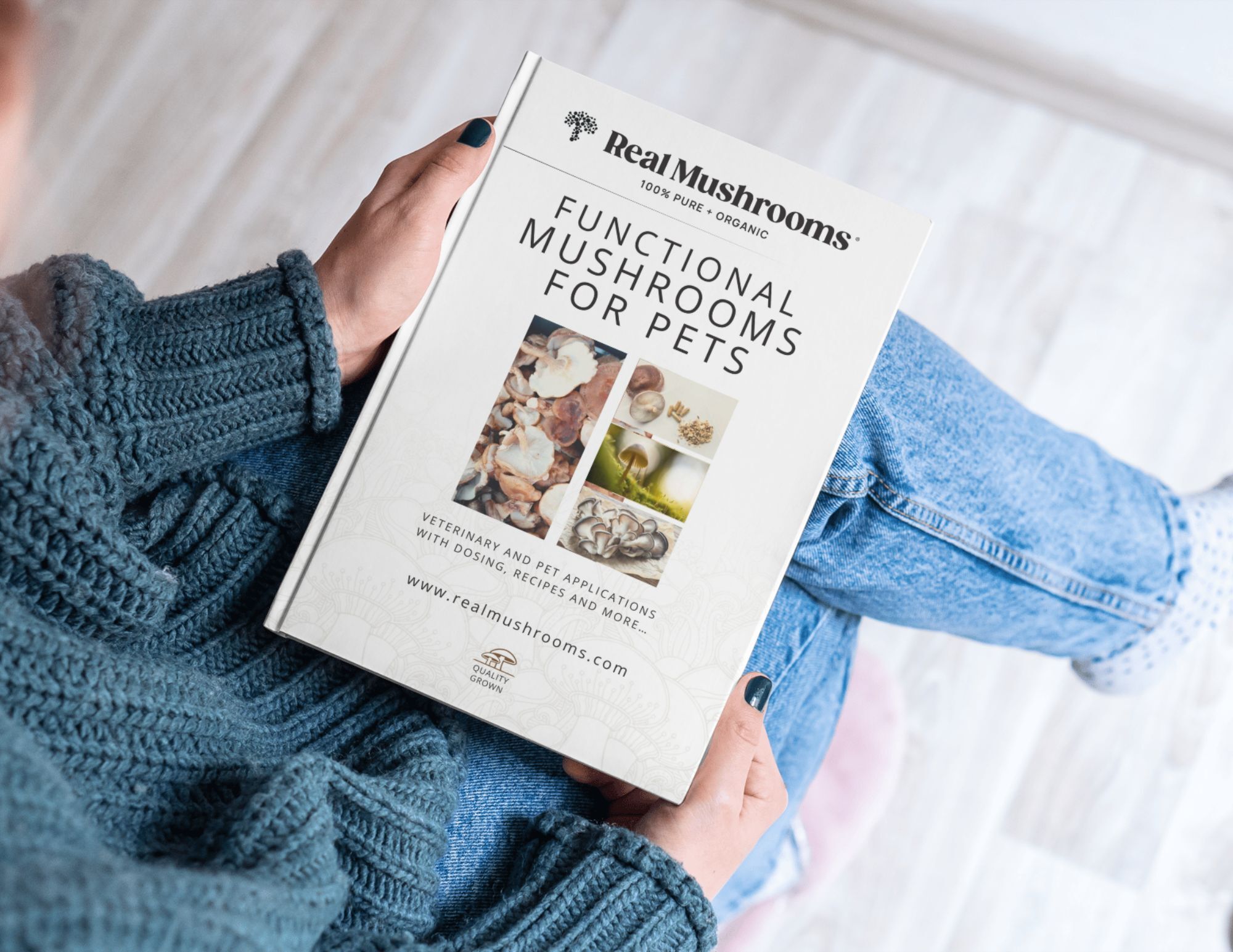
– Plus, Enjoy Exclusive Tips and Updates with Our Real Mushrooms for Pets Newsletter